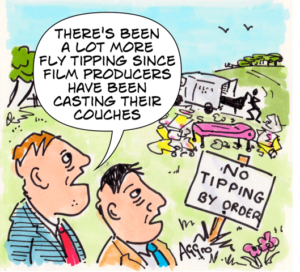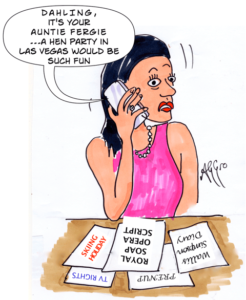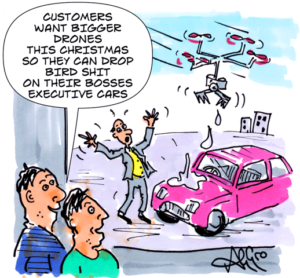30 November 2017
A lens on the week
UK

BREXIT: Posturing, grandstanding and a smattering of mischief making, all the usual ingredients of the U.K.’s relationship with the Republic of Ireland, have been on display in relation to Brexit. The problem is the border between Northern Ireland and the Republic. While no physical border is needed when the Republic and Northern Ireland are both in the EU, how are customs duties to be collected after Brexit? The UK says that this should be addressed once we know what the duties will be – and we will not know that until a trade deal has been done. The Republic points out that satisfactory progress on this issue must be made before trade talks begin and is anxious not to give away its leverage until the matter is resolved. Throw in the mischief making proposal that the North should remain in the EU, thus creating a customs divide within the UK, and you have a lot of megaphone diplomacy, exactly the opposite of the imaginative cooperation needed to deal with the problem.
Will uncertainty over the Irish border be the thing which prevents trade talks beginning in December? Probably not. European exporters are keen to see matters resolved sensibly and will be putting pressure on their governments to move forward to trade discussions. There are suggestions that a figure for the divorce settlement is nearly agreed and the EU will be keen to get that into a bankable form. Will Ireland take the heat and veto progress? Prepare for a fudge.
SOCIAL MOBILITY :A report by the Social Mobility Commission based on 2016 data finds that other parts of the country lag London in terms of social mobility. It is not, however, a simple North-South divide with low mobility being identified in a number of wealthy suburbs. Alan Milburn, Commission Chairman and former Labour MP, states that: “The growing sense that we have become an ‘us and them’ society – where a few unfairly entrench power and accrue wealth to themselves – is deeply corrosive of our cohesion as a nation.” Few, and certainly not the Prime Minister, would dissent from that but the question is whether the present government has the wherewithall to tackle it. The current anxiety to keep taxes down and to featherbed pensioners limits funds available and makes imaginative solutions less likely.

International
LEBANON: Prime Minister Saad Hariri returned to his country and withdrew the resignation he had announced eighteen days earlier in Saudi Arabia. He denies that he was a victim of coercion or detention in Riyadh, which just increases the mystery. In his resignation, which was broadcast on Saudi TV, he had claimed that his country is being taken over by the Iran-backed Shia militant group Hezbollah (with which his own Sunni party, the Future Movement, shares power) and that his life had been threatened (his father, a former prime minister, was murdered with a car-bomb in 2005 – and many allege that Hezbollah was responsible). President Aoun refused to accept his resignation until it was offered to him personally, and Mr Hariri (having returned from Saudi in a strangely prolonged and circuitous journey which took in Abu Dhabi, France – as the guest of President Macron – Egypt and Cyprus) has made no such offer and has promised his supporters that he will stay on for the sake of his country. Let’s hope that his change of mind isn’t giving Robert Mugabe any ideas.
BURMA: US secretary of state Rex Tillerson spoke out against the “horrendous atrocities” committed by the Burmese forces against the Rohingya Muslim population, and accused them of ethnic cleansing, as has the UN. His visit to Burma is followed by one by the Pope, who has begun a three-day tour during which he will be welcomed by Burma’s 60,000 Catholics (1% of the population) and meet Aung San Suu Kyi. He has recently spoken out against the treatment of the Rohingya, and expressed solidarity with them. However, his archbishop of Yangon, Cardinal Charles Maung Bo, has urged him not to use the word “Rohingya” in Burma. It will be interesting to see whether he does. This liberal Pope has already shown considerable courage in following his own path; conservative opponents in the Vatican have recently accused him of heresy and threatened the church with schism.
EGYPT: At least 305 people were killed by Isis jihadists in a carefully-planned and prolonged attack on a mosque in al-Rawdah, a village in Sinai. The mosque is run by the Sufi order, a mystical form of Islam which Isis rejects, although most of the members of the congregation weren’t themselves Sufis but orthodox Sunnis who had fled violence elsewhere in north Sinai, where an Isis-led insurgency is at war with the Egyptian armed forces. Egypt took part in a meeting of the Islamic Military Counter-Terrorism Coalition in Riyadh this weekend. The coalition is a Saudi-led group of the leaders of forty-one Sunni Moslem countries aiming to combat the spread of extreme Islamist ideas through mosques and on-line.

Financial
BOOTED OUT: Some of our readers may have visited Coalbrookdale, where Abraham Darby (amongst others) kicked off the industrial revolution. The deep valley was a centre for both early iron production and the fledgling china and pottery business, and much remains of that history. What readers may not have realised is that parts of that industrial activity still remained until this month, when the last ironworks finally closed. The business was the foundry of Aga Rangemasters in the Coalbrookdale works, founded in 1709. Aga announced last May that it could no longer sustain profitable production at the works and that it was reviewing its future. The result of that review was perhaps inevitable; Aga announced that it would officially close the works at the end of November, but paid off the workforce last week and closed its doors.
In the past six months the workers and the local council worked with Aga to try and find a resolution, but modern economics were against it – Aga was bought by Middleby Corporation of Chicago two years ago and Middleby has been reducing the number of sites that it produces from in Europe. Coalbrookdale produced iron castings for Aga cookers and stoves, a relatively simple production process, and one which latterly only employed 35 workers. Three hundred years ago the valley had ironstone, water, coal and limestone all nearby, and a navigable river and canal system to take finished products out; none of those advantages apply now, with all raw materials having to be brought in. Aga still have a castings foundry, at Kettley in the West Midlands, and that will stay open for at least the time being. The Coalbrookdale site will become part of the Ironbridge Museum; in a symbolic gesture the departing workers took off their boots and hung them on the foundry gates.
WET WET WET: Thames Water is not its customers’ favourite utility, or indeed the government’s. The consumers resent bills that increase by more than inflation whilst leaks and troubles with the understreet supply system cause disruption. The company has been fined several times for sewage leaks into watercourses, especially into the Thames. The long term alleviation measure of building a new main sewer under the river to parallel the Victorian system under the north Embankment is very expensive and disruptive in several congested London locations. But most controversial of all has been the removal of capital from the business – a process much more efficient than the company’s removal of sewage from its system – through a complex corporate structure routed via Cayman Islands ownership. That has meant big dividends for Thames Water’s primarily institutional shareholders which include investment funds alongside such entities as the China Investment Corporation and the Abu Dhabi Investment Authority (the company is privately owned, though by a number of shareholders), but left it unusually highly geared. That is not unusual for a utility with safe and reliable income streams but Thames has taken it to new lengths. But now the company has started to take note of customer, political, and media hostility, perhaps feeling also the potential touch of a Corbyn government in the pipeline. A new chairman, Ian Marchant, has been appointed; he is busy dismantling the complex ownership structure along with its tax advantages. This week he took a further big step and announced that Thames will not pay any dividends in the year ending June 2018, this is not that disadvantageous – the money will just stay in the balance sheet, but is a sign of a more sensitive approach, and that profits dropped 7% to £281m in the last half year.
If you enjoyed this post please share it using the buttons above.
Please click here if you would like a weekly email on publication of the ShawSheet

